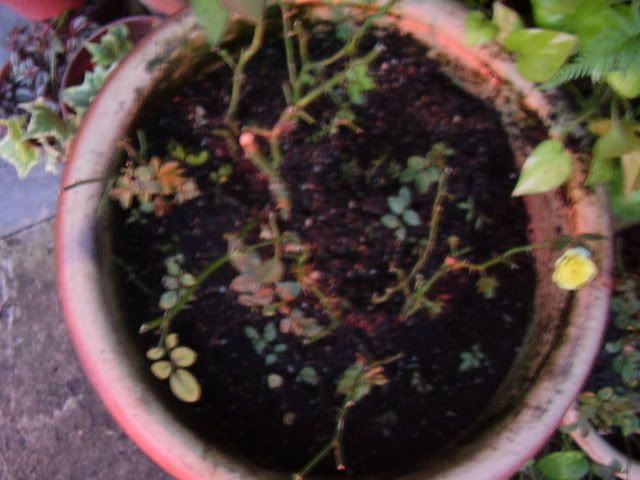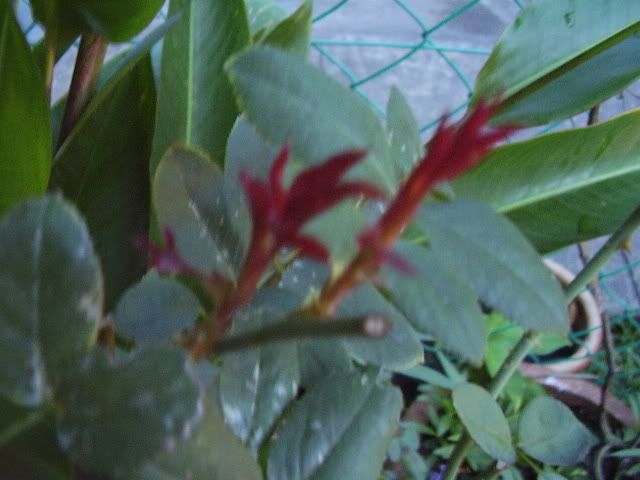|
|
Reply #1563 dilaOHdila's post
|
Waa.. cantiknya ros putih nih.. dila.. |
|
|
|
|
|
|
|
|
|
|
|
kengkawan... naz nk tanya....
naz punya ros siam (mini roses) macam kena penyakit ke...tataulah...
daunnya kerinting, coklat...sampaikan ke bunganya sekali merekut... tak bleh kena ujan ke? bunga tetap berbunga... tp daunnya habis rosak...
sape ada solution?? |
|
|
|
|
|
|
|
|
|
|
|
Wah..lawonya...
berkenan sgt ngan ros cikna no 2 & 4 tuh..
yg mizahanan tu satu pokok ke atau lelain ek..berkenan ngan yg tu gak..
Nazurah,
lastime saya pun kena camtu..saya kerat sumer, sembur ngan hb101 + easy food plant. Skang dah mula tumbuh pucuk baru. Cumanya saya kurang berkenan pucuknya naik sikit terus keluar putik bunga... |
|
|
|
|
|
|
|
|
|
|
|
Originally posted by nazurah at 4-2-2008 08:19 AM 
kengkawan... naz nk tanya....
naz punya ros siam (mini roses) macam kena penyakit ke...tataulah...
daunnya kerinting, coklat...sampaikan ke bunganya sekali merekut... tak bleh kena ujan ke? ...
sama lah kita, memang letak pokok tu kat tempat terbuka (not shaded la), tak leh ke?
jeles tgk pokok yg segar with daunan yg sihat sihat tuh.. aku punya tinggal batang jer... sebab asyik ada bintk hitam.. |
Rate
-
1
View Rating Log
-
|
|
|
|
|
|
|
|
|
|
|
nazurah, adnil...
alihkan saje pkk mu tuh kat tempat redup skit n tak kena hujan n panas terik. Cantas daun yg bermasalah berbintik2, kalu bwh daun kelihatan mcm ada selapis kapas..cantas juga. Jaga kebersihatan sekitar pangkal pokok n gembur tanah. Siram kawalan air dgn semburan min shj. Bagi baja 2 minggu sekali... belai2 skit pokok tuh.. lepas 2 minggu, sihat dah pokok mu itu.... kalu guna baja tahi kelawar, sure tak sempat bunga tuh nak gugur, dah tumbuh putik baru. Kdg2 sampai 8 putik utk setangkai..jgn tak caya... kalu guna baja tahi kelawar, sure tak sempat bunga tuh nak gugur, dah tumbuh putik baru. Kdg2 sampai 8 putik utk setangkai..jgn tak caya... Kalu tak de, guna rose food ok jgk..juga brand lain.. Kalu tak de, guna rose food ok jgk..juga brand lain..
Kalu tak de tempat, bole jgk letak kat dibawah lindungan sang pkk rendang.. Mini ros kalu kat tmpat redup, daunnya akan lebih byk n rimbun.. ikut pengalaman lah.. Mini ros kalu kat tmpat redup, daunnya akan lebih byk n rimbun.. ikut pengalaman lah.. |
Rate
-
1
View Rating Log
-
|
|
|
|
|
|
|
|
|
|
|
tu ler, lom dapat gie bangi lagi nak beli baja tahi kelawar tu, ari tu pegi ace hardware beli baja untuk ros dan tahi kambing. nampak gayanya kena alih ke tpt lain ler pokok nih..
cantiknyer ros oren cikna tuh... |
|
|
|
|
|
|
|
|
|
|
|
Reply #1573 nazurah's post
Naz...dia nak tuan baru tuh... |
|
|
|
|
|
|
|
|
|
|
|
Originally posted by cikna99 at 4-2-2008 10:52 PM 
nazurah, adnil...
alihkan saje pkk mu tuh kat tempat redup skit n tak kena hujan n panas terik. Cantas daun yg bermasalah berbintik2, kalu bwh daun kelihatan mcm ada selapis kapas..cantas juga ...
Cikna, ngapa ye ros saya tuh saya ubah ke bawah porch lepas kena masalah putik kering ngan pucuk kerinting..saya tgk pokok tu tambah tak bermaya..tu yg pindah balik ke tepi porch..baru segar balik..cumanya saya perasan masa jadi masalah putik kering ngan pucuk kerinting tu saya kurang siram ngan stop taruk easy plant food tuh..kes stok abis lah nih.. . . |
|
|
|
|
|
|
|
|
|
|
|
Reply #1577 nazurah's post
buds jgn la buang....izinkan dia berbunga jugak.. |
|
|
|
|
|
|
|
|
|
|
|
dah gondol pun

gambar amik kul 7am tadi... masih gelap lg... harap kengkawan bleh nampak....
this one looks healthier than yg atas tu...tp daun dia ttp ada mcm grey spot tu...
 |
Rate
-
1
View Rating Log
-
|
|
|
|
|
|
|
|
|
|
|
Black Spot of Rose

Yellowing rose (Rosa) leaves with black spots are
characteristic of black spot of rose
Black spot is caused by the fungus, Diplocarpon rosae. It is one of the most common diseases found everywhere roses are planted. The disease does not kill the plant outright, but over time, the loss of leaves can weaken the plant making it more susceptible to other stresses and winter damage. The disease is active during cool, moist weather. Conversely, extreme summer heat during July and August will limit development of the disease.
Symptoms and Diagnosis
Black spots, one-tenth to one-half inch in diameter, develop first on upper leaf surfaces. Areas adjacent to the black spots turn yellow and leaves drop prematurely, usually beginning at the bottom of the plant and progressing upward. Less commonly, raised purple-red blotches develop on immature wood of first year canes. These spots may later become blackened and blistered.
Life Cycle
The disease overwinters in diseased canes and infested fallen leaves. The fungal spores germinate in the spring and are disseminated by splashing water. Fungal spores on the leaf surface must be continuously wet for at least seven hours for infection to occur. Once infection is established, the fungus will develop fruiting bodies called acervuli in black lesions which, in turn, produce spores that splash to new tissue, spreading the disease.
Integrated Pest Management Strategies
1. Remove diseased leaves. As soon as diseased leaves are noticed, remove and dispose of them. Dead leaves on the ground should also be collected and destroyed. Compost only if this material will not be used back in rose beds. To minimize overwintering of the fungus, collect and remove all leaves from the ground in the fall, mulch with 2–3 inches of leaf mold or fine bark, and prune diseased canes before growth begins in spring.
2. Keep the foliage dry. The fungal spores need a wet surface to germinate and cause infection. Therefore, keep the foliage as dry as possible. Do not use overhead watering, or if you do, water early in the day so the foliage is dry by nighttime. Prune plants to allow more air circulation and facilitate the drying of foliage.
3. Use fungicidal sprays. Fungicides applied as a protectant provide good control. Fungicides will not cure infected leaves, but if applied regularly, will prevent infection of new leaves. Pesticides registered for use include captan, chlorothalonil (Daconil), copper, ferbam, mancozeb, maneb, sulphur, thiophanate methyl (Cleary 3336), and ziram. Many other products listed as rose dusts are also effective. Check the label for control of black spot. Most fungicides need to be applied every 7–14 days. Fungicides need to be reapplied following rain or overhead watering in excess of 1/4 inch.
4. Move the plants. You can limit the disease by growing roses in locations where they receive morning or, preferably, all day sun. This facilitates drying of the foliage.
5. Replant with more disease-tolerant varieties. Avoid highly susceptible cultivars, including most yellow and copper-colored roses. Roses reported to be highly resistant are: ‘Fortyniner,’ ‘Coronado,’ ‘Carefree Beauty,’ ‘Simplicity,’ ‘Bonica,’ and ‘Grand Opera.’ Ask about others at your nursery or check mail order sources.

The lower leaves on a rose (Rosa)
are the first leaves affected by black
spot of rose
|
Rate
-
1
View Rating Log
-
|
|
|
|
|
|
|
|
|
| |
|